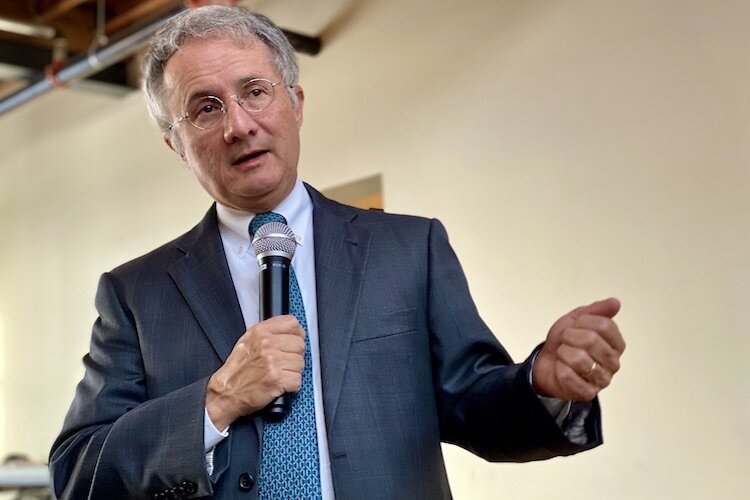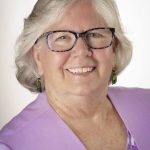Q&A: Dr. Charles Lockwood, SVP of USF Health
Dr. Charles Lockwood, Dean of the Morsani College of Medicine and SVP at USF Health, shares his insights about the state of healthcare and USF's role in it.

83D: What are the top 3 research projects with the greatest potential for making positive change in healthcare that are now taking place at USF Health?
Dr. Charles Lockwood: While there are many on-going basic, translational, and clinical research projects to select from, in my opinion, the three research projects on-going at the Morsani College of Medicine with the greatest potential to positively affect global healthcare are:
1. Determining causes of, and prevention for, Type 1 diabetes.
3. Determining the ways that malaria infects humans (and mosquitos) and why antibiotic resistance occurs (our malaria research group includes faculty from both the colleges of Medicine and Public Health).
The top three research projects for the College of Public Health with the greatest potential for affecting healthcare are:
2. Innovative approaches to the treatment of post-traumatic stress disorder.
3. Prevention of infectious diseases through Geographic Information Systems (GIS) and community-based interventions.
83D: As the state of Florida grows by 1,000 people a day in the next decade, what are the top 2-3 solutions for ensuring access to quality care?
CL: Patients and their families are increasingly concerned about immediate access to convenient healthcare. Thus, their behavior has finally begun to more closely resemble consumer behavior seen in other service industries. Historically, health care systems have been byzantine to navigate, expensive, and impersonal; even for those well-versed in health care. We are starting to see the market change significantly: from telehealth to home visits and from conveniently located urgent care facilities to extended office hours for traditional practices. The next age of healthcare will be “consumer-focused” or “direct-to-consumer” and will increasingly bypass traditional health care providers. Walmart’s new health care hubs are exemplars of this direct to consumer care focus; convenient, easy to access, and cash payments. Patients will demand the same ease of use and service that they have come to expect in other aspects of their lives (banking, retail, etc.). Amazon and Microsoft could disrupt the market even further.
Due to economic pressures and a move to value-based care (i.e., reimbursement for improving the quality and reducing the cost of an episode of care or capitated monthly payments for the care of select populations), health systems will need to achieve greater scope and scale to deliver on consumer-focused, high-quality, easy-to-access care. Traditional fee-for-service, “sick care” medicine will increasingly give way to these newer payment methodologies which incentivize keeping patients healthy and efficiently managing their entire episode of acute care or a discrete interval of chronic care. During this transition, systems will need to better understand how to use data and analytics to better coordinate care and more effectively, efficiently and equitably manage care. This transition will be extremely difficult for traditional health care organizations; as most health care markets in Florida still operate on volume-based, fee-for-service care — making the transition to value-based care more challenging than in the Northeast, Midwest, and West Coast.
I applaud [Florida] Governor Ron DeSantis’ efforts to curb medications costs. Annual expenditures on pharmaceuticals are approaching 20% of the total U.S. health care spend and brand drug costs are increasing at an unsustainable 15% per year, by far the fastest-rising expense in U.S. healthcare. There must be bipartisan federal and state efforts to curb these costs. Potential solutions include:
2. Accelerate generic drug approval and strengthen generic drug competition.
3. Reform the Orphan Drug Act to prevent astronomical increases in the cost of widely sold generic drugs.
4. End the FDA’s Unapproved Drug Initiative, which has made long-used, safe, inexpensive agents far more expensive.
5. Extend the shelf lives of medications to decrease wastage.
6. Allow the FDA to permit drug importation when there are drug shortages or high prices in the domestic supply.
83D: As growth occurs, how can we as a larger community prevent health inequities and disparities from increasing? Why does this matter?
CL: Local, state, and national governments must better support the healthcare safety net and fund America’s essential hospitals, federally qualified healthcare practices, and other groups of physicians/providers that serve those in need. The alternative is that under-resourced patients will increasingly fall through the healthcare cracks, with excess utilization of high-cost ERs, and sicker patients requiring more complex and expensive in-patient acute or out-patient chronic care, all of which is cross-subsidized by higher private insurance premiums. Without adequate resources to help provide value-based care to those that are most fragile, the system will continue to spend more and more.
Having said this, 80% of health outcomes have nothing to do with access to physicians, nurses, other providers, medications or hospitals, but rather by the social determinants of health. Poor nutrition and inadequate exercise cause obesity; dangerous neighborhoods and financial insecurity cause chronic stress that promotes chronic disease; smoking and substance use cause heart disease, cancer, stroke, and various other ailments. Addressing these social determinants of health will be crucial to reducing disparities in health outcomes among disadvantaged groups but it is an enormous challenge that will require a national consensus and long-term commitment of resources. All this matters because we seek a just, equitable, and healthy society — and because such a society will be more peaceful, verdant, and prosperous.
83D: If medical information doubles every 14 days and healthcare providers are among the most stressed and depressed professionals, what is the best strategy for practicing medical care providers as well as students to keep up and stay ahead without burning out or giving up?
CL: To improve provider wellness and reduce burnout, we obviously need a multimodal approach. From a systems perspective, healthcare institutions across the nation need to minimize the negative stigma of seeking help, improve the work environment by reducing inefficiencies in workflow and the extraordinary time burden posed by electronic health records. For individual students and healthcare providers, it is important to find ways to derive greater meaning from work, achieve work-life integration, have strong social support systems, and focus on mental and physical well-being. From the perspective of medical information overload, it is critical that we train physicians (students) to be life-long learners and master problem solvers.
83D: What is USF Health advocating to incentivize city planners and developers to provide more affordable housing in downtown Tampa and better transportation to the main campus to bolster the recruitment and retention of faculty, researchers, and students? How do we get there?
CL: The City of Tampa, in concert with other entities around the region, has an ambitious vision for expanding housing affordability across the city and beyond. There are more and more affordable housing options emerging and USF Health will support any planning agenda that will continue to address the need for a range of affordable housing options to serve a wide spectrum of residents across the community, and especially our medical students.
On the transportation front, there are numerous options in place to serve our downtown community, including the free TECO trolley that has stops conveniently located in front of CAMLS and the new downtown USF Health Morsani College of Medicine and Heart Institute (MCOM+HI) building. There’s the free Downtowner program for convenient pick-up and drop off. In addition, we’ve partnered with Tampa General Hospital (TGH) to expand their shuttle bus service to include a CAMLS and a medical school bus stop. There’re also scooter, bike shares, and rideshare programs throughout downtown and the surrounding area. And a relatively new express bus service connecting the USF North Campus area to downtown. Finally, for those who do drive, we provided access to nearly 1,000 parking spots in the Port Authority Garage very near the Med School, at prices comparable to campus parking costs. To date, the percentage of students who have purchased parking passes is lower than expected, which tells me we have a growing population taking advantage of alternative means of getting around, including walking!
83D: What needs to happen to ensure that more USF Med School grads stay in the Tampa Bay Area?
CL: We know that students who go through medical school and residency training in Florida have a near 80% likelihood of practicing in Florida. So, the short answer is: We need more high-quality residency slots. Currently, Florida is ranked 3rd in population but 32nd in terms of the number of residency training slots per 100,000 population (AAMC Florida Physician Workforce Profile). Thus, with the increase in public and private medical schools in the state over the past decade we now have a surplus of medical students and a relative shortage of residency positions. As a result, only about half of Florida’s medical students stay in the state for their residency training. Given that Medicare subsidizes residency education, we need to support [Florida] Congresswoman Kathy Castor’s strenuous efforts to increase federal funding of residency and fellowship positions in Florida.
83D: Now that the new medical school is open in downtown Tampa (congratulations!), what’s next for 2020 and the next 5 years?
CL: We plan to work with our primary clinical partner, TGH, to create a world-class academic medical center with nationally prominent marquee clinical programs offering cutting edge therapies, novel clinical trials, and premier residency and fellowship training programs while also working to address broader population health needs. We also plan to continue to ensure that all our USF Health students learn to work seamlessly together through inter-professional clinical training. Finally, we will continue to expand our NIH-funded research portfolio, which has grown 42% in the past 5 years. Such grant funding has an enormous economic multiplier effect as each dollar of NIH [National Institutes of Health] funding generates between $2.30 and 2.60 in local and state economic activity.
83D: Also, looking longer-term, say a decade or two into the future, what do you think will be the most significant innovation at USF Health that patients and providers are not experiencing now?
CL: We would like to not just pioneer cutting-edge care but couple that care with the highest possible patient satisfaction and consumer-centric services. However, we must also become exemplars of higher quality care for lower costs. Otherwise, as our amazing scientific team increasingly discovers cures for diseases that have long plagued humanity like type 1 diabetes, we will be unable to pay for them or offer them equitably to all Americans. We must also focus on keeping people healthy and preventing chronic disease (which is currently an epidemic). That will be achieved through more seamless coordinated care by providers and systems, national standards around data interoperability (allowing patients and providers to access health IT anywhere), and better engagement of patients to make lifestyle choices that are healthier.
83D: Any other important points you would like to lift up for public consideration?
CL: At USF Health and TGH, we are well on our way to becoming one of the Nation’s best Academic Health Centers. When that happens, patients will no longer leave Florida for the best medical care. Instead, they will come to Tampa to find the best care available.
To learn more, visit USF Health and the Morsani College of Medicine.
Lockwood biography
Dr. Charles J. Lockwood is Senior Vice President for USF Health, Dean of the Morsani College of Medicine and Professor of Obstetrics & Gynecology and Public Health at the University of South Florida. He serves as an Executive Vice President at Tampa General Hospital. Previously he was Dean at The Ohio State University College of Medicine and chaired Ob/Gyn departments at Yale and New York University. He graduated magna cum laude from Brown University, received his M.D. from the University of Pennsylvania and a Master’s in Healthcare Management from the Harvard School of Public Health. Lockwood served his Ob/Gyn residency at Pennsylvania Hospital, a Maternal-Fetal Medicine fellowship at Yale and a post-doctoral research fellowship at Mt. Sinai School of Medicine in NYC. His research has been funded by over two decades of federal and foundation support. He has published over 300 peer-reviewed publications (Google H-index of 79; 22,313 citations), 280 editorials, chapters and invited reviews, co-authored 5 monographs and co-edited 6 textbooks, 3 with multiple editions. He is credited with the leading the research team that discovered fetal fibronectin as a predictor of impending preterm birth and discovering the role of stromal cell tissue factor expression in regulating endometrial hemostasis and menstruation.
Lockwood has also served on multiple journal editorial boards and was Editor-in-Chief of Contemporary OB/GYN for 19 years where his editorials won 6 national publication awards. He has chaired and/or served on numerous NIH and FDA review panels, been an examiner for the American Board of Obstetrics and Gynecology, chaired multiple American College of Obstetricians and Gynecologists (ACOG) committees, and serves as a medical school accreditation reviewer for LCME. He has also served as president of the Society for Reproductive Investigation (SRI) and the American Gynecological and Obstetrical Society and currently serves on the National Board of the March of Dimes and the Foundation Board of the Society for Maternal-Fetal Medicine (SMFM). He is a member of the Sigma Xi and Alpha Omega Alpha research and medical honor societies, respectively, been named to national and regional “Best Doctors” lists annually since 1995, and has received multiple research awards including the SRI’s Distinguished Scientist Award, the NICHD Frontiers in Reproduction Beacon Award and the SMFM Lifetime Achievement Award. He is a recipient of the U.S. FDA Advisory Committee Service Award and ACOG’s Public Service Award for his “enduring commitment to women’s health.” He has been elected to the American Association for the Advancement of Science (AAAS) and the U.S. National Academy of Medicine.













